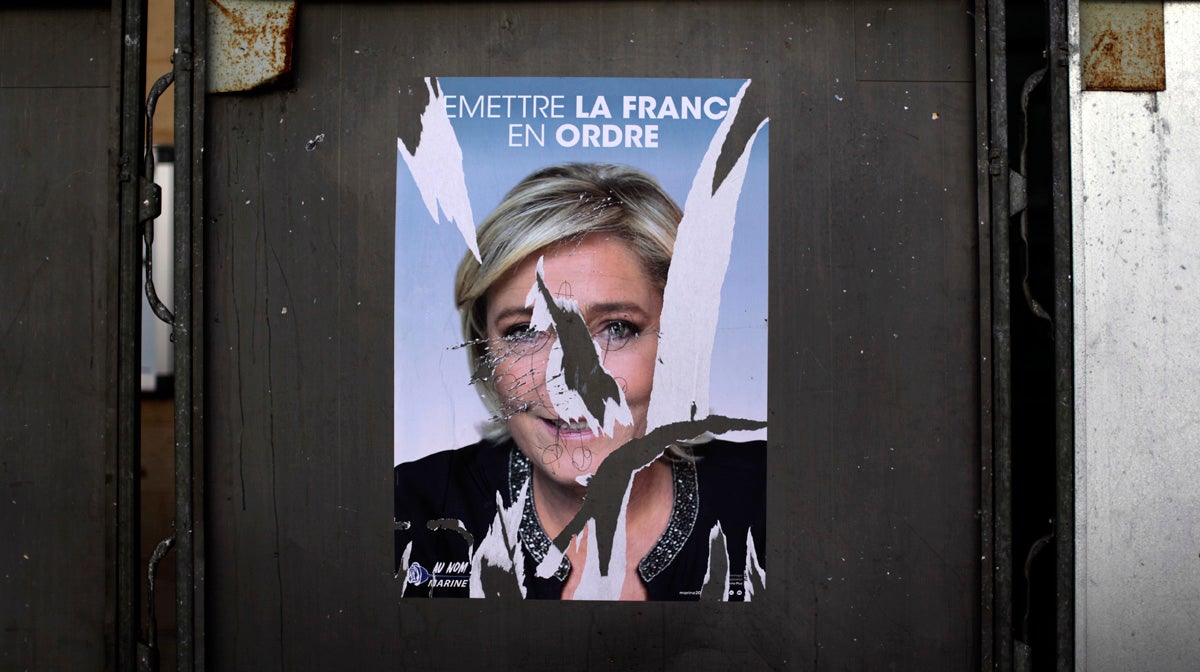Will the French be as stupid as us?

A torn poster showing a portrait of far-right leader and candidate for the 2017 French presidential election Marine Le Pen is seen outside at a polling station in Paris, Sunday, April 23, 2017. (AP Photo/Emilio Morenatti)
I wouldn’t presume to suggest that I foresaw the day when a racist right-wing extremist would seriously threaten to become president of France. But the anti-immigrant ire that has fueled the rise of Marine Le Pen was vividly expressed to me, nearly a quarter-century ago, when I reported from the coastal city of Marseilles.
The conventional wisdom, in the wake of Sunday’s first round of presidential voting, is that Le Pen — a toxic member of the Putin-Trump axis — will lose the runoff on May 7, thereby preserving western democracy in the heart of Europe. Yeah, maybe. The polls say she’s 20 points behind Emmanuel Macron, a newbie independent who finished first in Round One, an ex-banker who embraces inclusion, the European Union, and France’s humanistic Rights of Man. But after what happened on these shores last November, when America embraced its inner stupid, I’m tempering my optimism.
Fact is, there’s a huge French constituency for racist extremism. In the small towns, rural villages, and cities far removed from Paris (where Le Pen performed best), these voters are motivated. They’re being serenaded by Putin’s cybertrolls, who are already circulating lies and hoaxes about Macron, hoping to do in France what they did in America for their chosen stooge. But most importantly, the French backlash against immigrants has been building for decades, and Le Pen plays to that anger when she declares “I want to be the president of patriots.”
I heard those sentiments way back in June 1993, when I was a foreign correspondent sampling opinion in Marseilles. I won’t claim foresight, but in retrospect it’s clear why Le Pen’s National Front has reached the final round of voting. Marseilles (which voted for Le Pen in Round One) was a restive place in ’93; the white locals avoided the city’s old northern quarter, which smelled of Levantine spices and pulsed to the beat of North African music.
At one point I had dinner with a young accountant named Sadrine Begou (as I wrote, “she leaned forward, taking care to avoid dipping her blue-satin sleeve into her plate of sizzling mussels”), and she echoed many others when she said, “I am not trying to be racist, but the immigrants are not nice to the French people. They act very superior. You see them on the street, and they can be very mean. I think that, if they do not like France, they should not be here. I think they want to conquer France. And we do not want to lose our culture.”
The next day, a high school language teacher named Jean-Pierre Mouchon told me, “Please, this is not really, for me, racism. I am an old man. I remember Marseilles as it was. But the new Marseilles is no longer a French town. It is an African town … Just because this was the country of the French Revolution, that doesn’t mean we should take in everybody. We can’t be expected, within our borders, to live together with everybody.”
A teenage student named Richard Poutrel told me, “This is not a problem of racism, but to be in the north (part of the city), and just seeing them, this is frightening, just to think we might have problems with them. We don’t know them, and we don’t want to know them.”
The ’17 runoff election is shaping up as a contest between humanism and xenophobia, and, sure enough, that same French duality was vivid back in ’93. Helen LeFranc, a Marseilles activist and one the few whites who worked regularly with the immigrants, insisted that the majority culture was at fault: “France has failed at bringing these people into its society. This is supposed to be the country of the French Revolution and the Rights of Man.”
And Cecile Theraroz, a white saleswoman whose boyfriend was Tunisian, said that most French people were trying to relive the old days when France was a foreign conquerer: “People don’t understand the way colonization is still strong in their own minds. We were in places like Algiers, and we ruled them, so the French still want to discredit them. I see it when I’m out with my boyfriend. I feel like everybody is staring.”
A quarter-century later, these dueling sentiments — so fundamental to the contemporary French — are on the presidential ballot. Throw in the terrorism factor, the high French jobless rate, and Putin’s overt meddling, and prepare not to be shocked if Le Pen narrows that polling deficit. If she were to overtake Emmanuel Macron — by championing what columnist David Brooks calls “a virulent nationalism tinged with bigotry” — it would be the biggest far-right victory in western Europe since France’s Vichy regime did the Nazis’ bidding.
Which is what Donald Trump is rooting for. Naturally. In his words, Le Pen is “the strongest on what’s been going on in France.”
We’ll soon see whether France, like another nation I could name, is stupid enough to heed him.
—
Follow me on Twitter, @dickpolman1, and on Facebook.
WHYY is your source for fact-based, in-depth journalism and information. As a nonprofit organization, we rely on financial support from readers like you. Please give today.

